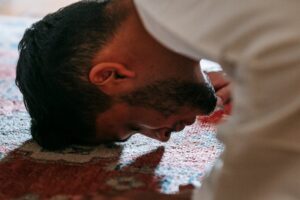Have you ever really thought about what you eat? What if everything was completely different? Allah (SWT) could have created blocks or globs of nutrition, some kind of complete food source with no variation of taste or smell or color or texture, had He so willed. It could have been something that humans just ingest everyday to survive, like mundanely swallowing a pill, with no pleasure or variety. But instead, Allah (SWT) in His infinite wisdom, created all types of animals and fish suitable to eat, each varying in flavors and textures. He (SWT) created all types of fruits and vegetables in a multitude of colors and shapes and textures and aromas, with variations of flavors, sweet and savory. He (SWT) gave us the ability to transform these creations into thousands of variations, some cooked, some fresh, some hot, some cold. Reflect on that for a minute… Of all the wonders of creation, food is definitely right up there with WOW that’s amazing! It’s a huge blessing, but also a huge test. Allah said He will test us in the things that we love, and man, we sure do love to eat.
I recently ran into an acquaintance I hadn’t seen in many months and noticed she had lost a good deal of weight. “You look great!” I said to her, “How did you do it?” (I asked her with a glimmer of hope that she might refer me to some new inexpensive miracle diet that I could eat cupcakes all day long and shed weight like an athlete.) She didn’t. She said, “I stopped eating sugar and I started walking around my neighborhood every day.” What? That’s IT? Walking? Gave up sugar? No turbo insanity workout $500 DVD set or membership to some $1,000 weight loss program with their own yummy pre-packaged delights? Nope. Walking and being conscientious of what you eat, just what the body was meant to do.
We live in a society of excess. Fast food, Super-sized portions, convenience foods, sugar filled carbonated beverages, and sweet or salty processed snacks have become the staple of our diet, void of essential nutrition our bodies require. Within our own Muslim cultures, ALL social interactions revolve around food. We think we need ten courses every night during Ramadan, and on the way to Taraweeh we are already planning what we want to eat the next night! We have become conditioned to believe that bigger is better; that second, third, and fourth helpings are normal. (Even though our first helpings are usually two or three serving sizes to begin with!) Our palates have become spoiled with the richness of calorie laden foods over natural nutritious foods. If given a choice between a rich decadent slice of cake or a plate of steamed broccoli, most (myself included) would reach for the cake without a moment’s hesitation.
We live in a world surrounded by haram, and it seems that we have given ourselves this outlet to indulge in something safe, something halal, which is the pleasure of eating. Yet to the point of extreme excess, that pleasure of eating becomes gluttony, something that is no longer halal. Allah (SWT) said in the Quran: Moreover, eat and drink freely, But do not be excessive. For indeed, He does not love those who are excessive. 7:31.
By indulging this pleasure, we have chained ourselves to our own lack of self-control. In Imam al-Mawlud’s Matharat al-Qulub, he speaks of the purification of the heart which leads to true freedom, requiring the emancipation from the bonds of one’s whims. “People may claim to be “free,” yet they cannot control themselves from gluttony in the presence of food…Freedom has real meaning when, for example, a situation of temptation arises and one remains God-fearing, steadfast, and in control of one’s actions. This holds true even when the temptation produces flickers of desire in a person who nonetheless refrains from indulging.”1
Obesity is an epidemic in our society. Illnesses directly or indirectly caused by obesity, poor diet, and lack of exercise are at an all time high, linked to higher rates of chronic conditions than smoking, drinking, or poverty.2 And yet, with the abundance of the edible blessings Allah has bestowed upon us, our Prophet (SAWS) did not leave us without simple instructions: “No man fills a container worse than his stomach. A few morsels that keep his back upright are sufficient for him. If he has to, then he should keep one-third for food, one-third for drink and one-third for his breathing.” (At-Tirmidhi).
Fasting for up to 18 hours a day for thirty days during the blessed month of Ramadan shows us what we are truly capable of, the level of self-control we routinely harness for the sake of Allah (SWT). Why then, have we convinced ourselves that we are unable or unwilling to harness a much lesser degree of that self-control all year round for the sake of Allah (SWT)?
So, anyone up for a walk around the neighborhood? Sure, right after I finish my plate of steamed broccoli…
By Connie Martin
[1] Purification of the Heart : Signs, Symptoms and Cures of the Spiritual Diseases of the Heart : Translation and Commentary of Imam al-Mawlud’s Matharat al-Qulub by Hamza Yusuf.
[2] Rand Health Institute




